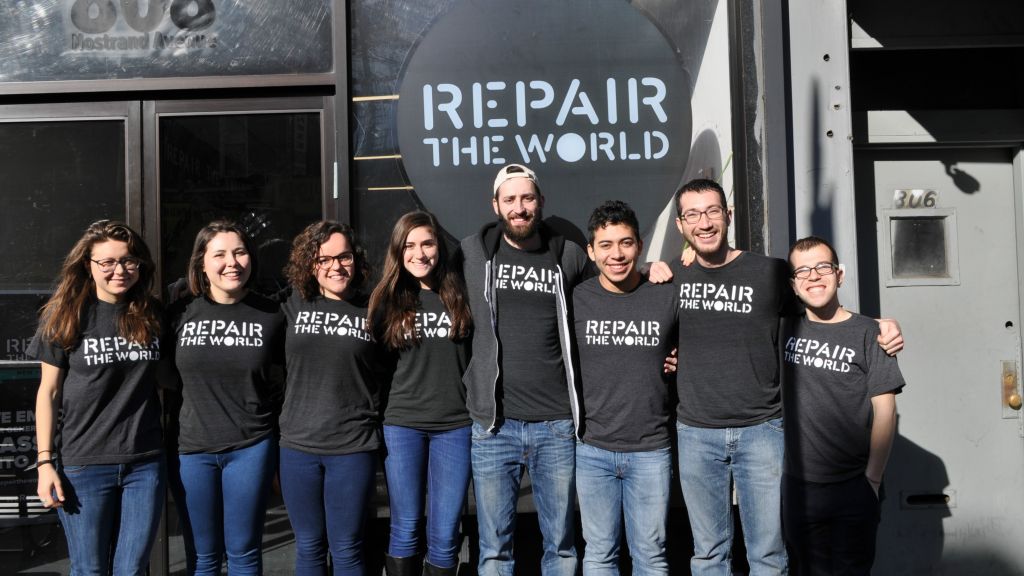Living to serve: Conference shows how to ‘do Jewish’ by helping others
October 20th, 2016
![]() NEW YORK — Mordy Walfish really didn’t want to volunteer during his bar mitzvah year.
NEW YORK — Mordy Walfish really didn’t want to volunteer during his bar mitzvah year.
“My parents forced me to do a service project for my bar mitzvah. I visited the elderly. I went kicking and screaming. I thought I’d do it for a year. It turned into six years. Then it became my career,” said Walfish, director of programming for Repair the World, just before the opening session of Service Matters: A Summit on Jewish Service.
Volunteering is how, to borrow a phrase from one of the sessions at the daylong conference in New York City, Walfish “Does Jewish.”
“Service is now as important to my Jewish life as ritual and ceremony,” he said.
Indeed, when Jewish millennials viewed their volunteer service through a Jewish lens they tended to more fully engage with their work — particularly when that work tackled things such as food scarcity, social justice and education. And, as an added bonus, they more fully connected with the Jewish community at large.
The trick is getting volunteers to stay long enough for this to happen.
Repair the World hosted the inaugural event together with more than 35 partners from across the fields of Jewish service, social justice, leadership development, and communal engagement.
During the day more than 200 social entrepreneurs, donors and Jewish educators explored innovations in service, how service relates to justice and faith, the funding of service initiatives and ways to boost the role of service in Jewish life.
“This was an important moment self-reflection for the Jewish Service movement,” said David Eisner, CEO of Repair the World, which equips partners and communities to engage tens of thousands of young Jewish adults as volunteers each year.
“I think we were all surprised to see how big and connected we all felt when we stood together, and also how optimistic and energetic we all felt — even at a time when the challenges we’re facing can feel overwhelming. We were energized by both the incredible amount that we’ve already accomplished together as well as the long road we have to go. Personally, I’m newly inspired to take the next steps with our partners in engaging more young adults in Jewish service and focusing on the real and important impact we want our service to have in our communities.”
Panelists came from several cities across the US, including Baltimore, Detroit, Miami, Tulsa and New York City. They represented more than 35 organizations including Hillel International, Moishe House, Hazon, City Year, Repair the World and Keshet.
‘We’re taught to read Hebrew, but not to understand it. We’re taught what Judaism is, but not how to be Jewish’
Additionally, many people at the conference said the chance to forge social connections with people from different backgrounds helped them feel more connected to Jewish values and awakened their Judaism, but also inspired them to continue volunteering.
Ian Cohen, Executive Director of Next Generation Men, said he was drawn to volunteer work because he felt there was a missing piece to his Hebrew education.
“How we educate kids in Hebrew school is lacking. We’re taught to read Hebrew, but not to understand it. We’re taught what Judaism is, but not how to be Jewish,” Cohen said. “Judaism isn’t presented as something useful. I started to believe service is inherent to Judaism. I believe service is actually baked into our religion from the beginning.”
He said it wasn’t until he worked with Teach for America that he felt his Jewish identity crystallize.

2016 Repair the World Fellows in front of their Crown Heights headquarters. (Repair the World/ via JTA)
“I was in a school that was 99% African-American and mostly Christian. When they [the students] found out I was Jewish they asked me ‘Where’s your hat?’ It was a teachable moment,” Cohen said.
Cohen also uses the experience with Teach for America at Next Generation Men, an organization built by teachers that works with students of color in many areas including leadership development and community support.
Whether it’s working with Bend the Arc, which advocates for “a more just and equal society” or Hazon, the largest environmental organization in the Jewish community, summit participants emphasized the many possibilities to make a difference in their own communities or just a neighborhood or two away.
“You don’t need to go to Haiti to do service. You can do it in your backyard,” Walfish said.